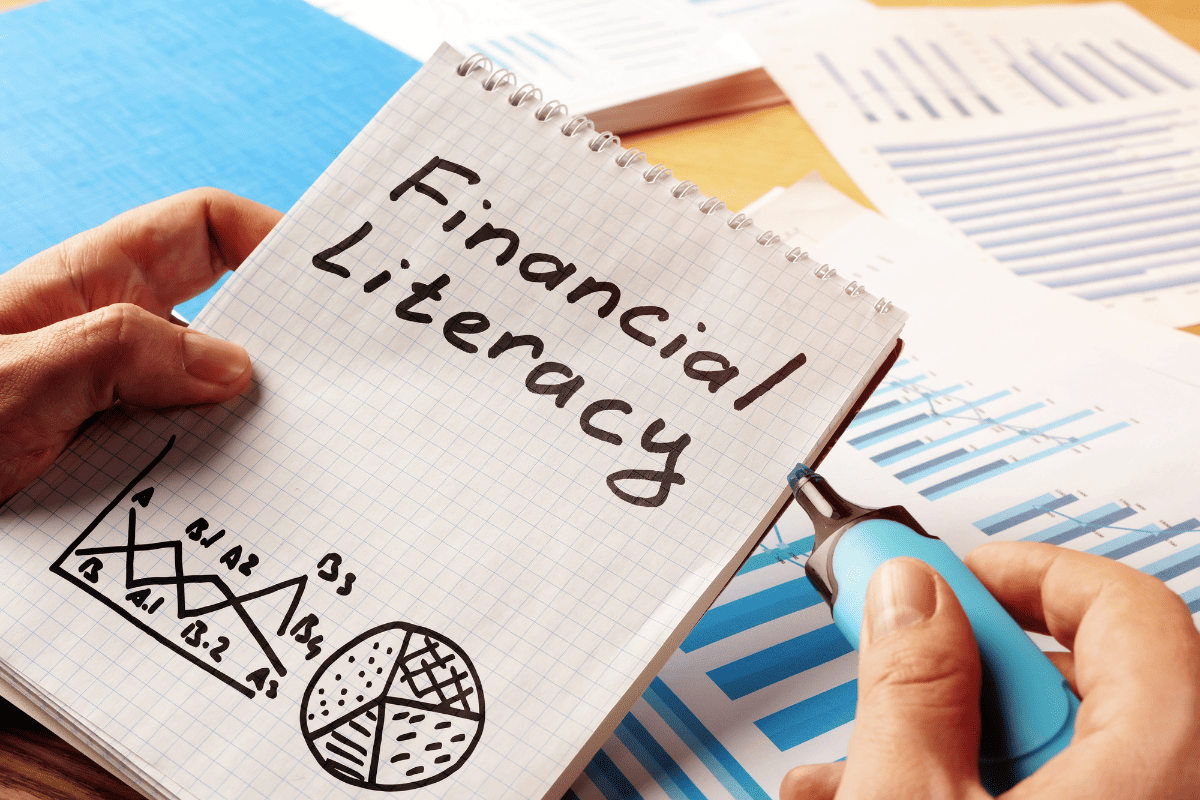What is financial literacy and why is it important for everyday life?
Have you ever felt like your money disappears too quickly, or been confused about how to manage your finances so you don’t overspend every month? Well, all of that has to do with financial literacy. Simply put, financial literacy helps us better understand how to manage our money, so life feels more stable and planned.
The more financial choices we have, the more important it is to understand them so we don’t make the wrong moves. In this article, we’ll talk about why financial literacy matters in everyday life. Read until the end, okay?
What Is Financial Literacy?

Financial literacy is the ability to understand and manage your personal finances. It includes everything related to money, from how to create a budget and plan your finances to choosing the right financial products such as savings, insurance, investments, or credit.
Being financially literate isn’t just about knowing how to make a monthly budget to avoid overspending. It’s also about managing debt, understanding interest, or choosing investments that match your financial goals. Someone with good financial literacy can make smarter decisions about money, avoid falling into debt traps, and make the most of opportunities to grow their assets.
Beyond that, financial literacy also involves understanding the risks and benefits of every financial decision. For example, knowing when it’s the right time to save or invest, and how to protect yourself from financial risks like fraud or hidden fees in financial products. In other words, financial literacy is a foundation for building financial stability and managing the future in a more secure and well-planned way.
The point is, financial literacy is not just about knowing how to handle money. It’s about understanding how every financial decision we make can affect our lives in the long run. That’s why more and more people are starting to realize how important financial literacy is, especially now that access to financial information is so easy.
Why Financial Literacy Matters in Daily Life

In everyday life, we often need to make financial decisions that matter. This is where financial literacy plays a big role. Here are a few reasons why it’s important:
1. So you’re not always broke halfway through the month
Financial literacy helps you avoid running out of money before the end of the month. By understanding how to manage money, you can plan a clear budget for essentials like paying bills, grocery shopping, and saving for emergencies.
It also teaches you how to prioritize so that your important needs are met before your wants. As a result, life feels more peaceful without the stress of money problems.
To make things easier, there are many tools you can use. One of them is the Honest App, a credit card app that helps you track your spending in real-time with instant notifications to your phone. This way, you can stay on top of your finances without the hassle and always know where your money is going.
It’s important to remember, having a credit card doesn’t mean you have to go into debt. In fact, if used wisely, a credit card can be a powerful tool to manage your money. For example, paying bills with a credit card can help you separate monthly needs, automatically track expenses, and take advantage of promos without messing up your main cash flow.
With the Honest Credit Card through the Honest App, if you pay your bill in full and on time, your admin fee is 100 percent refundable. There are no annual fees, your card info is only accessible through the app, and there are daily promos to help you save more.
So a credit card isn’t your wallet’s enemy. If you know how to use it right, it can actually be a helpful partner to manage your money smarter, safer, and more organized.
2. Having emergency funds you can rely on
Beyond just helping you manage your finances, financial literacy also plays a big role in preparing an emergency fund for urgent situations. An emergency fund is like a financial safety cushion you can rely on when something unexpected happens, like a medical emergency, sudden home repairs, or other important needs.
By understanding financial literacy, you’ll learn how to allocate your income wisely. For example, setting aside 10 to 20 percent of your earnings to gradually build your emergency fund. This ensures you can still meet your daily needs without feeling overwhelmed.
When your emergency fund is in place, you won’t have to panic or rush to borrow money when things get tough. It’s not just about financial security — it’s also about peace of mind, knowing you’re in control.
3. Clearer plans for the future
You probably have dreams or goals for the future, right? Maybe you want to own a house, buy your dream car, go on pilgrimage, save for your child’s education, or retire peacefully. If you understand financial literacy, all of that will be easier to achieve.
Financial literacy acts like a life guide for managing your money wisely. You’ll know how to make detailed plans, set a budget, save regularly, and even start investing so your money can grow over time.
Another benefit of being financially literate is that you become smarter with your priorities. You’ll avoid spending on unnecessary things and focus more on what really matters. If you stay disciplined and consistent, those goals can be reached one by one — maybe even faster than you think — and you’ll be on your way to financial freedom.
4. Becoming smarter with investments
Financial literacy isn’t just about saving or managing your expenses. It also helps you become smarter when it comes to investing. When you understand financial basics, you’ll know how to choose investment options that match your goals and risk profile — whether it’s stocks, mutual funds, gold, or property.
This knowledge helps you avoid rushing into decisions just because of trends. Instead, you’ll focus on strategies that actually make sense for you. For example, you’ll understand the importance of diversification to reduce risk, or how to benefit from compound interest to grow your wealth over time. So your money doesn’t just sit in savings — it actually works for you and helps bring your big dreams to life.
5. Avoiding financial scams
Lastly, financial literacy protects you from scams, especially those disguised as investments. When you understand how money works, you’ll know how to spot offers that sound too good to be true.
For example, you’ll understand that all investments carry some level of risk. So if someone promises huge returns in a short time with no risk at all, you’ll be immediately cautious. Financial literacy also teaches you to always check if a company is legally registered, read terms and conditions carefully, and not fall for sweet promises.
The point is, you’ll become more critical and not easily fooled. That way, you can protect your money and avoid falling into traps.
What are you waiting for?
Get your Honest Card today










